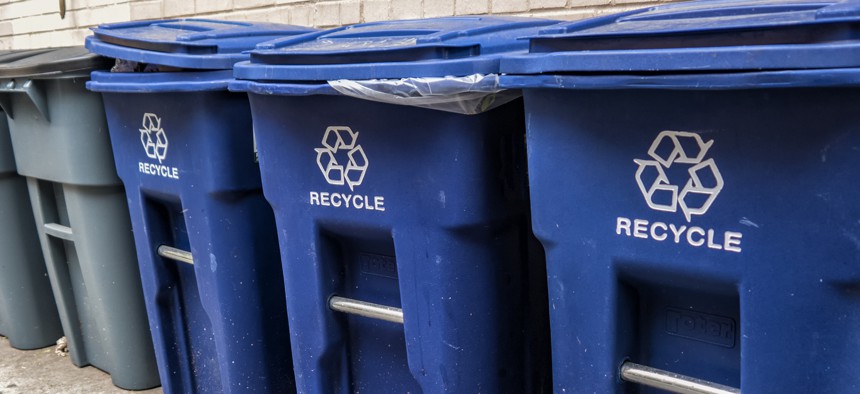How Local Governments Can Deal with Recycling Scofflaws

Blue recycle bins on the street iStock.com/elvis901
Education is often cited as the key to improving recycling rates and reducing contamination. But a new report suggests cities might be better served by cutting off problem households.
When it comes to reducing contamination in local curbside recycling programs, some households may be a lost cause.
That’s one of the takeaways from a new report assessing strategies local governments can take to improve recycling rates.
Many local governments have invested in education programs meant to increase recycling—including campaigns that send waste management workers to rifle through recycling bins and alert residents when they contain non-recyclable items.
But a report from the Solid Waste Association of North America (SWANA) finds that these strategies do not work for all residents and that local governments may need to take more drastic measures if they want to improve recycling rates among different groups.
"There is a misconception that everyone will want to recycle and will want to do the work it takes to recycle,” said Jeremy O’Brien, the director of applied research at SWANA.
Cities and counties have increasingly struggled to keep recycling programs running since China stopped accepting most foreign recyclables, including plastics and paper, in 2017 due to the high level of contamination by non-recyclable materials. The move by China has led to higher costs to recycle materials in the United States and some local governments have scaled back curbside recycling programs or stopped accepting glass or other materials.
To improve recycling compliance, SWANA advises that local governments may need to deploy new initiatives among resident groups—which could include the suspension of recycling services.
"The idea of recycling becoming a privilege and pulling recycling carts away from residents historically goes against the grain of local governments,” O’Brien said.
A small but growing number of local governments are using the tactic, O’Brien said. The change may be representative of both the increasing financial pressures facing local governments and the growing frustration with households that fail to recycle properly even after education campaigns.
The SWANA report highlights the results from recycling programs in two Ohio cities, Gahanna and Reynoldsburg, as examples of the problem. After the cities replaced 18-gallon curbside recycling bins with 64-gallon roll-out cans, the amount of recyclable material collected remained about the same but the contamination rate among the collected material increased. The problem stemmed from an increase in contamination among households that had previously been identified as doing a poor job at recycling, according to the report.
The number of households classified as “low performers,” who had 25% or higher contamination rates, increased from 23% to 28%. The low performers also became responsible for a bigger portion of the non-recyclable items included in the bins. Before the bin sizes changed, low performers were responsible for 52% of the overall contamination, but after the larger bins were put to use, they became responsible for 69% of the overall contamination, according to the report.
“This increase in contamination occurred despite extensive educational outreach conducted during the bin-to-cart conversion program,” the report said. “This finding suggests that increased education alone is not likely to have a significant impact on the contamination caused by this group.”
There were positive benefits from the Ohio cities’ expansion. The number of households classified as “high performers,” meaning their recycling had less than 10% contamination from non-recyclable materials, increased from 39% to 50% of households after the larger bins were distributed.
“By recognizing the different motivations and perspectives of these groups, more cost-effective anti-contamination programs can be developed and implemented,” the association wrote in its report.
Advocacy groups and the Environmental Protection Agency have undertaken new initiatives to increase awareness about which materials are recyclable and which are contaminants. Meanwhile waste management companies have promised new equipment and technology investments to improve waste sorting capabilities.
The SWANA findings indicate that while education has an important role to play in increasing recycling rates, it will not solve the entire problem, O’Brien said.
"There is a growing recognition that contamination is a pretty big problem in our system and there is a group that really contributes a lot to this problem and they don’t really care,” he said.
Through the report, O’Brien said he hopes more local governments will begin to have discussions about what can be done to address the households that haven’t changed their ways.
Andrea Noble is a staff correspondent with Route Fifty.
NEXT STORY: States' Covid-era Budget Surpluses Could Pay For Infrastructure





